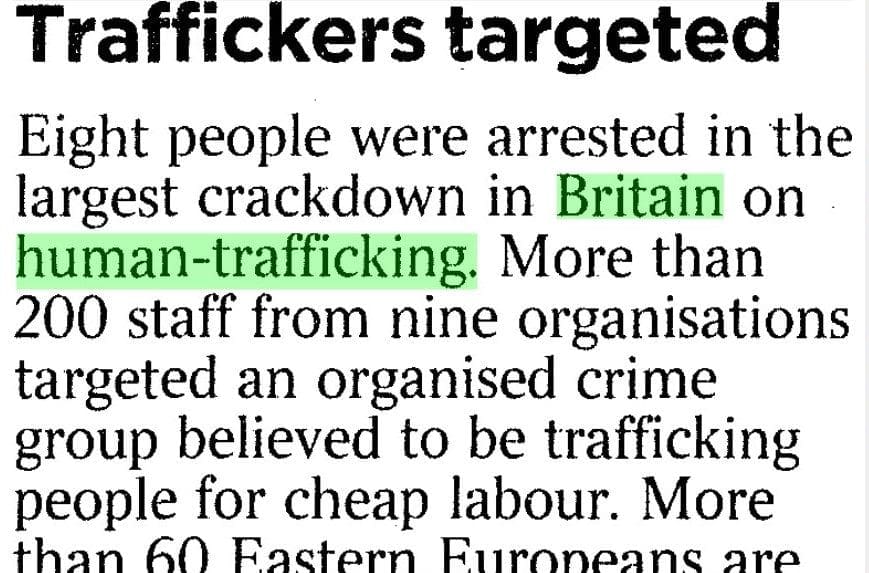By Tiria Barnes, Gale Student Ambassador at the University of Liverpool
Despite slavery being outlawed in the nineteenth century, human trafficking – defined by the Tearfund as ‘the transporting or abduction of people for the purposes of exploitation, using coercion, fraud or deception’[1] – is still a prevalent problem in our world today. In 2015, it was estimated that the trafficking industry was worth 32 billion US dollars a year, which is equivalent to the GDP of Tanzania[2]. As the fastest growing business in the world, it has been suggested that every 30 seconds a child is trafficked[3]. I decided that it would be interesting to investigate human trafficking on a more local scale, and see how newspapers reported on Britain’s response to the problem. Using Gale Primary Sources, I was able to make some thought-provoking discoveries.
The first article I found was written in 2008 and is from the Times Digital Archive. It highlights that in Britain’s ‘largest crackdown’ on trafficking, 8 people were arrested for their involvement in the industry and more than 60 Eastern European victims were found. This news indicates that Britain was taking the necessary, successful steps to combat the issue.

The second article I found was also from the Times Digital Archive but it had a different tone to the previous. Aidan McQuade responds to Theresa May’s statement in 2012, in which she said that the UK was planning to opt out of more than 130 European police and criminal justice measures[4]. McQuade argues that opting out would have serious repercussions for Britain’s attempt to crack down on human trafficking. For example, he highlights how joint investigation teams have previously been successful in the organisation of justice operations across borders, notably shown by the breaking up of a child trafficking ring across the EU and UK. He then questions how the Government could consider not being a part of such successful measures if its priority it to tackle human trafficking. McQuade consequently suggests that Britain’s desire to dissolve the industry may not be as strong as they had previously claimed.

The next article I discovered using the Gale Primary Sources platform was from the Financial Times Historical Archive, written by Krishna Guha. This source is interesting as it discusses the initial agreement between France and the UK to share information on migration and ‘mount joint intelligence operations’, as discussed in the Times article mentioned above. The political correspondant quotes David Blunkett, the Home Secretary in 2002, where he had claimed that ‘we will secure a change in relation to border controls in France and work jointly together so these operations will be seen to be a joint endeavor’. Here, the article seems to pose that human trafficking requires unity between countries who are willing to work together closely.

The last article I looked at was written in 2003 and is found in the Financial Times Historical Archive. Bob Sherwood highlights that Lord Goldsmith had warned that ‘police and prosecutors are failing to tackle the million pound “growth in industry” of human trafficking in Britain’. Moreover, the attorney-general suggested that cooperation was needed between investigators, prosecutors, and law enforcement agencies in different countries. Lord Goldsmith also suggested that government action would be significantly limited if this cooperation between groups was failing. Once again this suggests that good, cross-border relationships were thought to be the most effective way to tackle the human trafficking problem.

Overall, these articles seem to suggest that Britain was most successful in its attempt to combat the human trafficking crisis when it had joint investigation teams and strong cooperation with other countries. This is something to be considered when dealing with the ongoing issue of modern day slavery.
[1] ‘What is Human Trafficking?’, Tearfund, accessed: 25/04/2018, https://www.tearfund.org/Sites/TILZ/Resources/Publications/Footsteps/Footsteps_91-100/Footsteps_96/What_is_Human_Trafficking
[2] ‘What is Human Trafficking?’, accessed: 25/04/2018, https://www.tearfund.org/Sites/TILZ/Resources/Publications/Footsteps/Footsteps_91-100/Footsteps_96/What_is_Human_Trafficking
[3] ‘One Child Trafficked Every 30 Seconds for Sex and Labour Says Tearfund’, accessed: 25/04/2018, https://www.tearfund.org/media/press_releases/one_child_trafficked_every_30_seconds_for_sex_and_labour_says_tearfund/
[4] ‘Why Does Theresa May Want to Opt Out of 130 European Justice Measures?’, accessed: 25/04/2018, https://www.theguardian.com/politics/2012/oct/15/theresa-may-european-justice


